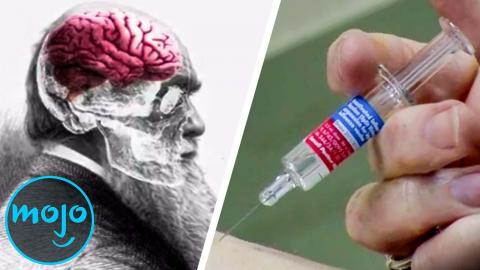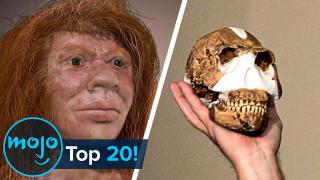Top 10 Greatest Scientific Discoveries of All Time

#10: Heliocentrism
We all know today that the Earth revolves around the Sun. However, ancient times saw this model, heliocentrism, compete with geocentrism, which imagined Earth at the center of the solar system. The first known heliocentrism model was proposed in the 3rd century BCE, but the geocentric model dominated, and heliocentrism was only presented as a mathematical model in the 16th century CE by now-famed astronomer Nicolaus Copernicus. This led to the Copernican Revolution, a universal acceptance of heliocentrism in science and astronomy. It wasn’t without protests, however, from Copernicus’ contemporaries and the Catholic church. There have been alterations to the model over time, yet it remains to this day.
#9: The Human Genome Project
Top 20 Biggest Scientific Discoveries of the Century So Far
Our understanding of DNA has come a long way from its initial isolation in 1869. Subsequent developments over the next century eventually led to the initiation of The Human Genome Project in 1990. The Project aimed to map all human DNA and present the first official sequence of the human genome. By 2003, 92% of the genome had been fully sequenced. The rest was finally completed by early 2022. This has contributed to significant advances in human biology and medical science, allowing scientists to identify genes and genetic variations associated with specific diseases or traits. With tools like CRISPR, it’s now possible to edit such genes for therapeutic or research purposes.
#8: The God Particle
Top 10 Greatest Astronomy Discoveries
Some discoveries take a lot of time and effort, which was the case for this one. The Higgs boson particle was first theorized in 1964 by Peter Higgs and his colleagues. It’s been referred to as the “God Particle” as it is considered responsible for providing mass to all matter. However, it was only discovered in 2012, thanks to CERN’s Large Hadron Collider - a 17 mile ring of superconducting magnets that boosts the energy of particles. Isolation of the Higgs boson confirmed previous theories about the nature of matter, and opens many doors for further research into its structure.
#7: The Theory of Relativity
Top 10 Greatest Paleontology Discoveries Of All Time
When he was 16, Albert Einstein imagined chasing a beam of light. That eventually led to his theory of relativity, which consists of two parts. Special relativity states that the laws of physics are the same for all observers moving at a constant speed relative to each other, and that the speed of light is a constant that can’t be exceeded. One result is the famous equation E = mc2, where ‘e’ stands for energy, ‘m’ for mass, and ‘c’ for the speed of light. General relativity adds gravity, explaining that it’s a result of how matter and energy curve space, rather than a force. The theory transformed science, spurring massive advances in physics and cosmology.
#6: Quantum Mechanics
What If You Entered The Quantum Realm? | Unveiled
Einstein’s general theory of relativity is excellent for studying objects at large scales. However, when it comes to the smallest scales, scientists rely on quantum mechanics. The term was coined in the 1920s by physicists working to fill in the blanks in classical physics. It involves some incredibly counterintuitive concepts, such as the uncertainty principle and quantum entanglement, which involves spooky ‘action at a distance’. However, for now, it’s the best theory we have to explain the behavior of atoms and subatomic particles. The study of quantum mechanics has led to the development of key technologies such as lasers, MRI machines, transistors, and more.
#5: The Big Bang
Top 10 Amazing Scientific Discoveries You May Have Missed
Interestingly, the term Big Bang was coined by an astronomer who considered the theory to be mistaken. On a BBC Radio programme in 1949, physicist Fred Hoyle proclaimed his disagreement with the “hypothesis that all the matter in the universe was created in one big bang”. The theory has since become widely accepted: around 13.787 billion years ago, an infinitely dense singularity exploded, creating space and time and everything in it. The theory originated with the realization that the universe is expanding, and received landmark evidence with the discovery of cosmic microwave background radiation in 1965. It allowed us to calculate the approximate age of the universe and begin to understand the history of the cosmos and our very minor place within it.
#4: Evolution
Is This the Moment Humans Broke Away From Evolution? | Unveiled
The concept of evolution dates back to Ancient Greece, when in 500 BCE, philosopher Anaximander suggested that humans must have evolved from other animals. However, evolutionary ideas weren’t scientifically theorized and published until Charles Darwin’s “On the Origin of Species” in 1859. Darwin theorized that through natural selection, species evolved to better survive their respective environments and reproduce. In 1863, biologist Thomas Henry Huxley published his book “Evidence as to Man’s Place in Nature”, which suggested that humans and apes are in the family family tree. The theory has met with considerable opposition from some religious groups, but ample evidence has built a strong scientific consensus.
#3: Germs
A few decades before germ theory replaced miasma theory, which blamed ‘bad air’ for diseases, Hungarian obstetrician Ignaz Semmelweis made a shocking discovery. In 1847 he found that when medical practitioners washed their hands, it significantly reduced patient mortality. His peers jeered at his discovery, but really, he was just ahead of his time. Towards the end of the century, the work of microbiologists like Louis Pasteur and Robert Koch helped prove that germs, including bacteria and viruses, cause diseases. This allowed researchers to create specialized ways to counter them.
#2: Penicillin
One of the greatest discoveries of all time was accidental. In 1928, Scottish physician Alexander Fleming returned to work after a holiday to discover a mold growing in a Petri dish of Streptococcus bacteria. Fleming noticed that the bacteria was unable to grow in the area surrounding the mold, which was secreting an antibacterial substance he named penicillin. At the time, Fleming’s contemporaries were unimpressed. A decade later, a team of scientists at Oxford were able to use penicillin to cure test mice of several bacterial infections. During World War II, it went into mass-production, paving the way for a number of other antibiotics. It’s estimated that this one discovery has saved 200 million lives.
#1: Vaccines
How Long Do Vaccines Take To Make? | Unveiled
When faced with a virus, our immune system detects ‘antigens’ and produces ‘antibodies’ in response. Vaccines follow the same principles - introducing harmless or weakened antigens into our bodies to stimulate our immune systems. The idea harks back to Late Imperial China, when it was discovered that rubbing scratched skin with material from smallpox patients could inoculate someone. Gross, but effective! Known as variolation, it was also practiced in India, Sudan, and Turkey, before reaching Europe. In 1796, English physician Edward Jenner used variolation to create the first smallpox vaccine. A century later, Louis Pasteur developed new vaccines. In the 1930s, scientists realized that viruses could be cultivated in chicken eggs. Since their discovery, vaccines have saved countless millions of lives; a lot of us wouldn’t be here today without them!








